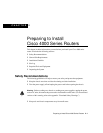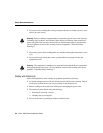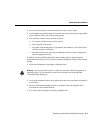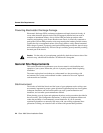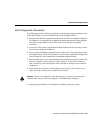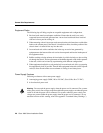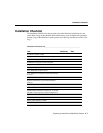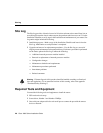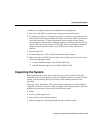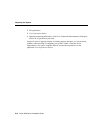
2-6 Cisco 4000 Series Installation Guide
General Site Requirements
Equipment Racks
The following tips will help you plan an acceptable equipment rack configuration:
• Enclosed racks must have adequate ventilation. Ensure that the rack is not overly
congested because each unit generates heat. An enclosed rack should have louvered
sides and a fan to provide cooling air.
• When mounting a chassis in an open rack, ensure that the rack frame does not block the
intake or the exhaust ports. If the chassis is installed on slides, check the position of the
chassis when it is seated all the way into the rack.
• In an enclosed rack with a ventilation fan in the top, excessive heat generated by
equipment near the bottom of the rack can be drawn upward and into the intake ports of
the equipment above.
• Baffles can help to isolate exhaust air from intake air, which also helps to draw cooling
air through the chassis. The best placement ofthe baffles depends onthe airflow patterns
in the rack, which can be found by experimenting with different configurations.
• When equipment installed in a rack, particularly in an enclosed rack, fails, try operating
the equipment by itself,if possible.Turnoff other equipment in therack (andin adjacent
racks) to allow the unit under test a maximum of cooling air and clean power.
Power Supply Features
Following are features of the router power supply:
• Autoranging power supply (200W, 100 to 240 VAC, 50 to 60 Hz, 40 to 72 VDC)
• 6-foot electrical power cord
Warning Do not touch the power supply when the power cord is connected. For systems
with a power switch, line voltages are present withinthe power supply even when the power
switch is off and the power cord is connected. For systems without a power switch, line
voltages are present within the power supply when the power cord is connected. (To see
translated versions of this warning, refer to the appendix “Translated Safety Warnings.”)



